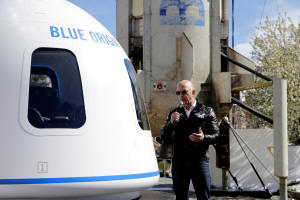Blue Origin awarded its first NASA interplanetary launch contract for
Mars mission
 Send a link to a friend
Send a link to a friend
 [February 10, 2023]
By Joey Roulette and Steve Gorman [February 10, 2023]
By Joey Roulette and Steve Gorman
WASHINGTON (Reuters) - Blue Origin, the private space company founded by
billionaire Jeff Bezos, was awarded its first interplanetary NASA
contract on Thursday to launch a mission next year to study the magnetic
field around Mars, the U.S. space agency and company said.
Plans call for Blue Origin's recently developed New Glenn heavy-lift
rocket to blast off with NASA's dual-spacecraft ESCAPADE mission in late
2024 from the Cape Canaveral Space Force Station in Florida, the agency
said.
It will take the identical twin ESCAPADEs, short for Escape and Plasma
Acceleration and Dynamics Explorers, about 11 months to reach Mars
orbit, where they will capture data from the planet's magnetosphere and
its interactions with solar radiation.
New Glenn, with a reusable first stage designed to be flown on at least
25 missions, is named for pioneering NASA astronaut John Glenn, who
became the first American to orbit Earth in 1962.
Blue Origin has flown previous NASA missions with its smaller,
suborbital New Shepard rocket, which can carry research payloads on
short, microgravity trips to the edge of space and back.

But ESCAPADE gives Blue Origin another line of business with a valuable
government customer as Bezos' rocket company begins to compete with
SpaceX, United Launch Alliance and other major players for flights to
low-Earth orbit and beyond.
Blue Origin, known for its astro-tourism business for wealthy customers
and celebrities, is one of 13 firms NASA chose last year for its
Venture-class Acquisition of Dedicated and Rideshare missions (VADR)
program.
[to top of second column]
|

Amazon and Blue Origin founder Jeff
Bezos addresses the media about the New Shepard rocket booster and
Crew Capsule mockup at the 33rd Space Symposium in Colorado Springs,
Colorado, United States April 5, 2017. REUTERS/Isaiah J. Downing

VADR essentially is intended to spur private development of private
space launch vehicles by assigning lower-cost NASA science missions
to new rockets with an unproven record and higher chance of failure.
In doing so, NASA takes on greater risk by using promising upstart
rocket services with whom commercial customers might be unwilling to
fly initially.
NASA says the maximum possible price for a launch under the VADR
program is $300 million. The space agency declined to disclose the
value of the ESCAPADE contract, calling such information
proprietary. Blue Origin also declined to discuss financial details.
Although ESCAPADE marks NASA's first flight on New Glenn, that
booster has been selected to carry payloads to orbit for three
leading satellite operators: Eutelsat, JSAT and Telesat, according
to Blue Origin.
The company also has said Amazon's Project Kuiper satellite
constellation has chosen New Glenn for 12 launches over five years.
(Reporting by Steve Gorman in Los Angeles and Joey Roulette in
Washington. Editing by Gerry Doyle)
[© 2023 Thomson Reuters. All rights
reserved.]This material may not be published,
broadcast, rewritten or redistributed.
Thompson Reuters is solely responsible for this content.
 |